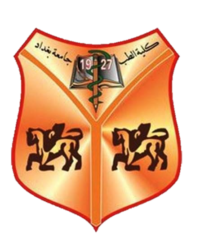Curriculum Description - Clinical Pharmacology
This course description provides a necessary summary of the most important characteristics of the course and the expected learning outcomes for the student to achieve evidence of whether they made the most of the available learning opportunities. It must be linked to a description of the program.
General Description
| Category | Details |
|---|---|
| Name of Organization: | Baghdad College of Medicine |
| Department: | Pharmacology |
| Module Name: | Clinical Pharmacology |
| Course Pattern: | Large group lectures |
| Semester and Year: | 4th Year / Semester 1 & 2 |
| Total Course Hours: | 60 |
Goal of the Course
- The student after the end of this module should know:
- The drugs that are used in treatment or prophylaxis for different diseases that affect cardiovascular, respiratory, endocrine, hematology, gastrointestinal, neurological, and psychiatric diseases as well as drugs used in treatment and prophylaxis of bacterial, protozoal, viral, and fungal infections.
- The mechanisms of action of these drugs.
- Drug and food interactions of these drugs.
- Adverse and toxic effects of these drugs.
- Pharmacokinetics and dynamics for these drugs.
- Other uses, indications, and contraindications of these drugs.
- Clinical applications of these drugs in clinical problems.
Outcome of this Module
A. Cognitive and Theoretical Goals:
- The drugs that are used in treatment or prophylaxis for different diseases that affect cardiovascular, respiratory, endocrine, hematology, gastrointestinal, neurological, and psychiatric diseases as well as drugs used in treatment and prophylaxis of bacterial, protozoal, viral, and fungal infections.
- The mechanisms of action of these drugs.
- Drug and food interactions of these drugs.
- Adverse and toxic effects of these drugs.
- Pharmacokinetics and dynamics for these drugs.
- Other uses, indications, and contraindications of these drugs.
- Clinical applications of these drugs in clinical problems.
B. Skills:
- How to write medical prescriptions.
Methods of Learning
- Large group lectures.
- Web-based learning activities.
- Student self-study.
Methods of Assessment
- Summative (end module) assessment.
- Mid-module assessment.
- Occasional short quizzes.
C. Values and Sentimental Goals:
- Communication skills with patients.
Methods of Learning
- Team-based learning.
Methods of Assessment
- Mid-module exam and final exam.
D. General and Qualifying Skills (Other Skills Related to Employability and Personal Development):
- Communication skills learning.
- Learning and developing ethics.
- The acquired knowledge helps the student with future relations with patients.
Infrastructure
| Category | Details |
|---|---|
| Course Books Required: | Lippincott Illustrated Reviews: Pharmacology |
| Main References (Sources): | Katzung: Basic and Clinical Pharmacology |
| Recommended Resources: | Goodman & Gilman Pharmacological Basis of Therapeutics |
| Electronic References: | Medscape, Google, Others |
Course Development Plan
- Decrease the number of students recruited to medical college.
- Increase the number of teaching staff in clinical training.
- Improving the skill lab to supply more smart manikins useful in clinical teaching.

